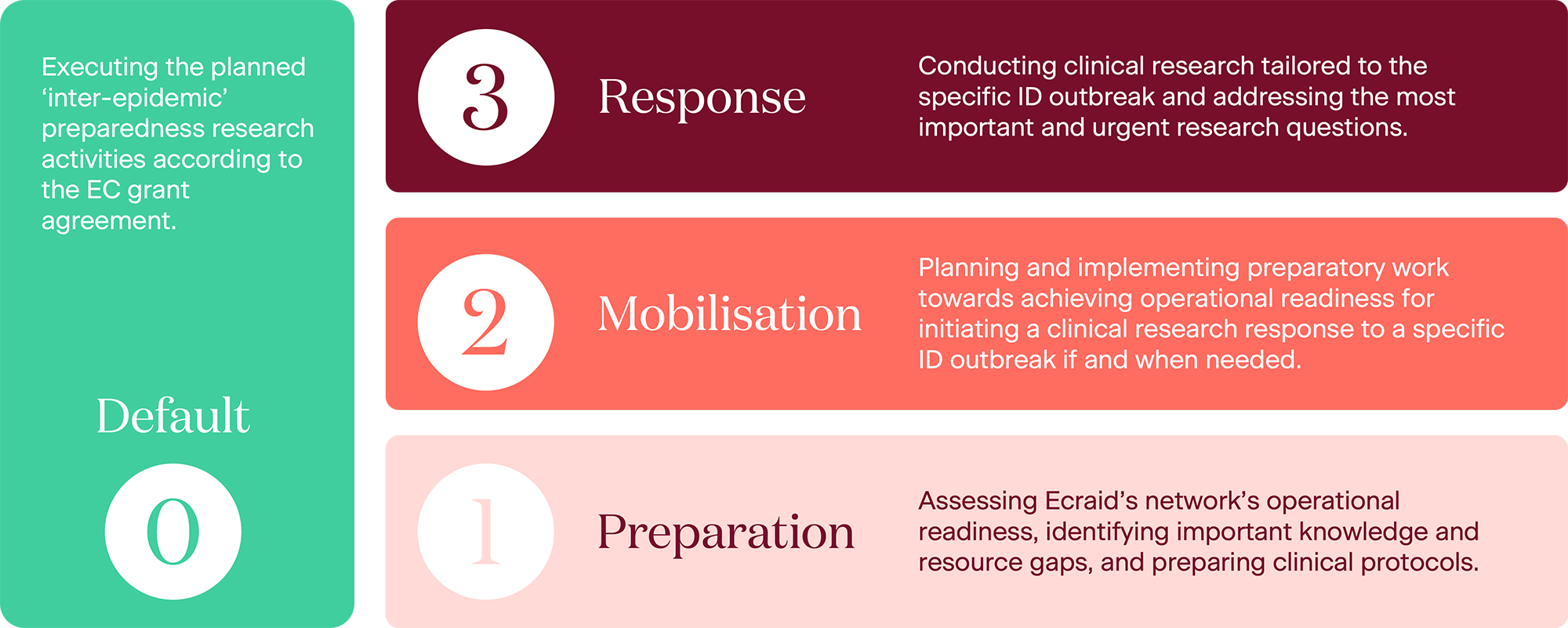Outbreak response modes
Ecraid aims to contribute to Europe’s capacity for rapid clinical research response to severe infectious disease (ID) outbreaks with epidemic potential by establishing a pan-European warm-base clinical trial network that is continuously conducting clinical studies ready to respond to new ID threats.
To be effective and efficient, we have set up a procedure for monitoring of and responding to emerging disease outbreaks that was first developed in the EU-funded project PREPARE. Read further to learn what we do and how you can help us.
How does Ecraid respond to ID outbreaks?
At any given time, Ecraid operates in one of four Outbreak Response Modes:

During inter-epidemic periods (Mode 0), we deliver observational and interventional multi-site clinical studies across Europe. These research activities are orientated toward syndromes of acute, community-acquired infectious diseases with epidemic or pandemic potential.
In case of a threat of a (re-)emerging severe ID outbreak, epidemic or pandemic, an internal assessment is made to define the most appropriate response for that ID outbreak.
- Mode 1 is triggered if the ID outbreak presents a limited threat to Europe.
- Mode 2 is triggered if the ID outbreak presents a potential threat to Europe.
- Mode 3 is triggered if the ID outbreak presents an immediate threat to Europe.
How is Ecraid triggered to respond?
The assessment process begins when a formal outbreak response 'trigger' request related to a specific threat is submitted by email to outbreak@ecraid.eu. This trigger should contain an outline of the author's concerns and the response they would like Ecraid to consider. The trigger form can be downloaded here.
Who can trigger Ecraid to respond?
Anyone can submit a trigger related to unusual infectious disease activity that poses a threat to Europe and requires a clinical research response. However, you must support your request with credible and expert information.
To date, all triggers have come from expert sources that have information about unusual infectious disease activity inside or outside of Europe.
What is the scope of Ecraid's response?
Ecraid delivers a clinical research response, which is different from a public health response. While completing the trigger request, you will be asked to give examples of the kind of response you deem necessary, including suggestions for clinical research questions. This is not mandatory, but if you do suggest clinical research questions, please note that we are not obliged to address them.
What happens once a trigger is received?
As soon as a trigger request is received, it will be screened to check that the information presented is valid, current and up to date. In response to a valid trigger, an internal Ecraid expert group meets within 24 to 72 hours of the request being received. This group is led by Ecraids CEO and CSO and two additional members from the Ecraid Coordinating Committee (selected upon the characteristics of the reported threat), all having expertise in clinical microbiology, epidemiology and/or infectious disease.
Using expert source data and expert opinion, this group will decide whether there is a need for a clinical research response by considering, for example, what is known about effective prevention, diagnostic and treatment options for that outbreak, and if there are outstanding clinical research questions within the remit of Ecraid to respond to. The group will decide on what outbreak response mode should be activated.
How long does it take for the group to make a decision on the appropriate outbreak response mode?
This can vary. Ecraid tries to act as fast as possible. However, there are often many unknowns during an emerging outbreak and we must ensure our decision to act is not premature. The expert group is actively monitoring any ID outbreak and its decisions are guided by the best available evidence.
The outcome of and rationale for an Outbreak Response Mode decision is communicated back to the trigger request's author and published on the Ecraid website.
![]() Ecraid's outbreak response mechanism is supported by the ECRAID-Base project which has received funding from the European Union’s Horizon 2020 research and innovation programme under Grant Agreement No. 965313.
Ecraid's outbreak response mechanism is supported by the ECRAID-Base project which has received funding from the European Union’s Horizon 2020 research and innovation programme under Grant Agreement No. 965313.